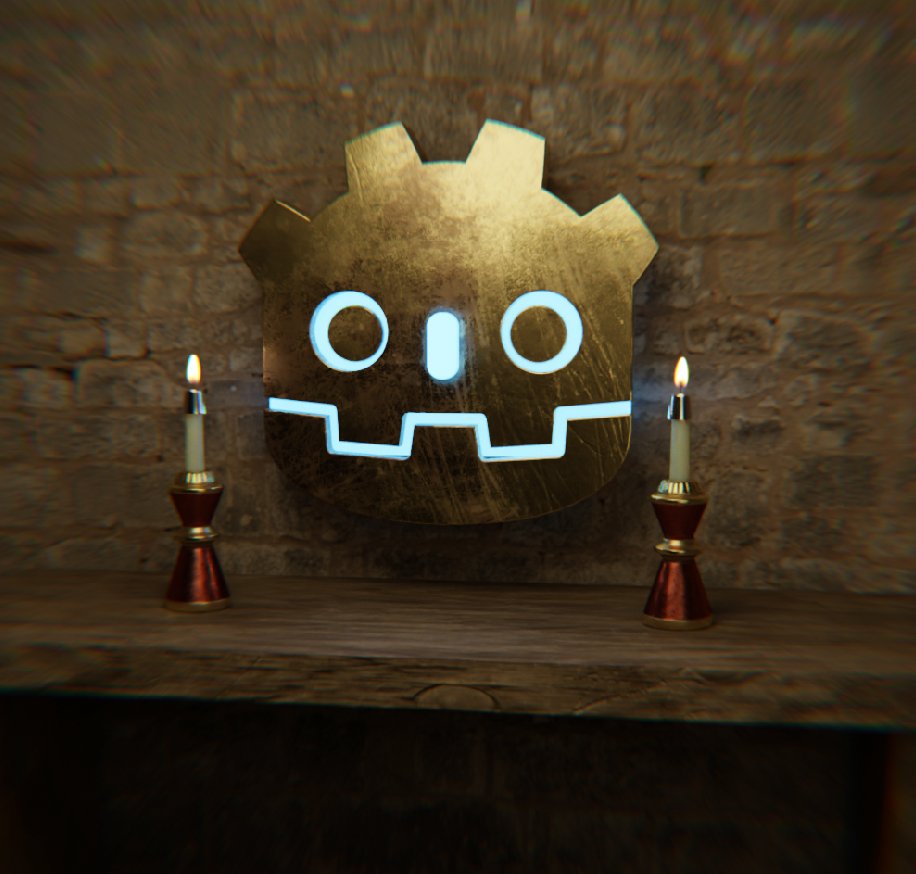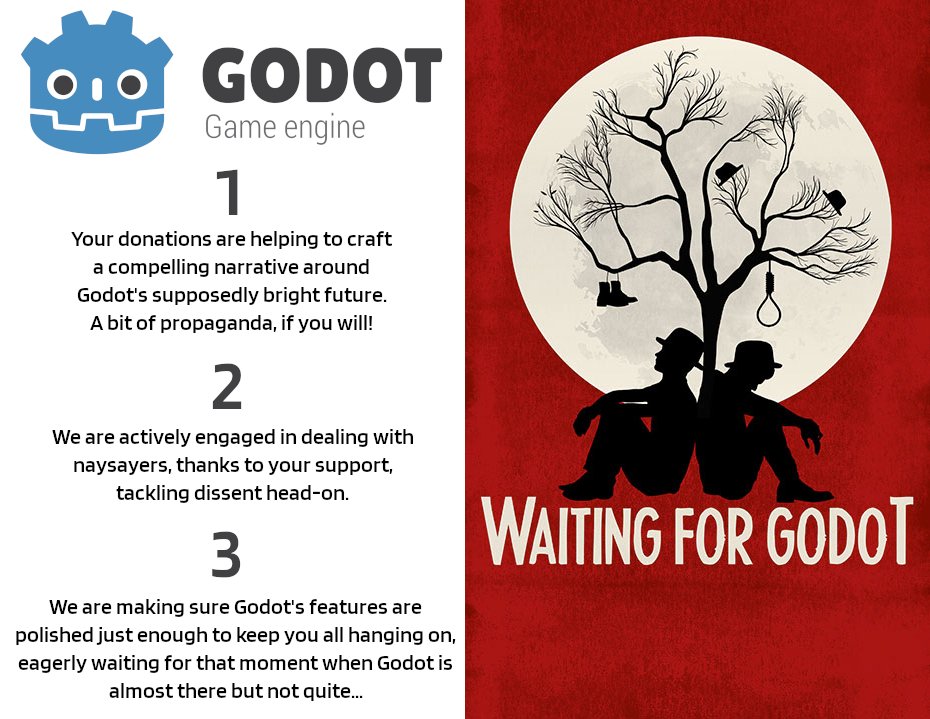Blue Robot Cult

Godot Initiation Ritual - By יעקב
Godot Engine is a cult, albeit an IT-focused one. While many people are familiar with the seemingly friendly user side of Godot, it is important to recognize that cults often operate in this manner—outwardly welcoming but internally abusive. Most Godot users have no clue about the dynamics within the core contributors’ community, and contributors often cannot recognize abusive behavior towards them due to the undue influence of Godot’s toxic leadership.
Here’s a quick summary graph that humorously encapsulates what it’s like to navigate through all the stages of indoctrination in the Blue Robot Cult—a descent that ends in complete disillusionment:
After a discussion in Devil's Rejects about the problems, flaws, and years of fundamental 'still broken' things in Godot with other disillusioned years-long Godot users -- I slapped together this mock graph (and yes, I admit I'm terrible at graphs). 🤣 pic.twitter.com/qzPeoWvnoc
— LillyByte (@LillyByteGames) May 17, 2023
When people claim that Godot is a cult, its followers or those heavily influenced by it might label you a conspiracy theorist, accuse you of holding personal grudges, or even call you crazy. The following clip is from a satirical documentary about cults, adapted to fit the Godot community. In the clip, a woman wearing a shirt that says “Cult Member” calls you insane:
As an ex-developer of @GodotEngine, here is what kind of response I hear from the members and followers of Godot cult in return. #GodotEngine #CancelGodotEngine pic.twitter.com/CIyMwE7HzU
— Andrii Doroshenko 🇺🇦 (@Xrayez) June 9, 2022
While Godot is commonly viewed as just a game engine, it has also been variously defined as a movement, a cult, a grift—you name it. The truth is that Godot encompasses all these facets, depending on the local communities and cultures surrounding Godot. Nevertheless, when we scrutinize the actions of Godot members, particularly the hypocritical behavior exhibited by Godot’s leadership, it becomes evident that they predominantly function with a cultic, groupthink mindset. Regardless, it remains undeniable that Godot wouldn’t be what it is today without its leadership.
Some respected followers of Godot openly acknowledge its cultic nature. They assert that Godot is indeed a cult, but interestingly, they do not view it as a negative characteristic1:
Godot definitely is a cult, but it’s not a bad thing.
It is true that not all cults are inherently destructive. However, when we examine other cult characteristics, it becomes apparent that Godot exhibits signs of being a toxic cult. Some of these signs manifest as subconscious cognitive dissonance, as evident from what aforementioned Godot follower replied further:
If you do, in earnest, believe Godot is a cult, then posting this to the cult members on the forum certainly will not be taken well.
You should definitely check out the in-depth analysis of the discussion surrounding this issue2. It not only pushes back against attempts by Godot followers to scapegoat a former member, but also reveals how their own behavior contributes to the toxicity within the Godot community. Sadly, the analysis has been removed by Godot forum moderators (not locked, but deleted entirely), which only serves to reinforce the initial hypothesis put forth in the analysis. This deletion was pretty much expected given their predictable behavior.
When we examine Godot as a cult, it’s crucial to clarify what is meant in this context. One has to realize that there exists a difference between a cult and a sect. The term “cult” typically brings to mind something related to religion. Traditionally, a sect is often associated with a religious group that has broken away from a larger religious organization. However, a cult also refers to a group with extreme devotion to a person, idea, or thing, often led by a charismatic leader.
Discovering that Godot is a sect would be incredibly shocking. But besides the fixation on manifesting Godot-related symbolism in the real world and people devoting themselves to the Godot ideology, there isn’t sufficient evidence to support that claim. At least, not at this point! 😉
The new, future studio for my #GodotEngine youtube channel. Lot of work left, but will be worth it. pic.twitter.com/Nlpwj32KKh
— StayAtHomeDev (@StayAtHomeDev) March 2, 2024
YouTube channel? Nah! #GodotEngine YouTube channel? Yes please! 🙃
However, considering the origin of the Godot’s name, derived from Samuel Beckett’s Waiting for Godot, a tragicomedy where Vladimir and Estragon wait for an enigmatic character called Godot who never arrives, one could marginally view Godot as a religion, see Value of Waiting. Godot is open to various interpretations, and there is faith in Godot’s eventual arrival. In Waiting for Godot, Vladimir and Estragon even contemplate suicide, making this an eloquently concerning factor. This satirical poster encapsulates the essence of Blue Robot Cult:

Godot is like a neo-cult, an echo chamber which exists mostly in the realm of mental constructs where Information Technology (IT) plays a significant role in their brainwashing, such as openwashing methods, or plain big lies. There is clear evidence to support this claim. Let’s highlight some of the cult characteristics of Godot:
- Godot is offered free of charge under an extremely permissive license.
- Godot has a charismatic leader, Juan Linietsky, aka reduz, who is a communal narcissist.
- Godot is extremely welcoming to newcomers and promotes an image of a playful community.
- Godot is preoccupied with recruiting new followers, particularly younger people.
- Godot fixates on fund-raising despite allegedly being developed purely out of love.
- Godot presents itself as innovative, novel, unique, and even elitist.
- Godot exhibits an us-vs-them mentality, such as attacking potential competitors.
- Godot discourages and blocks criticism, such as making comparisons with other engines.
The following meme pretty much sums up the problem of Godot’s inability to handle criticism:
It's sooo much easier to combat your critics than to focus on fixing your engine. #Godot #GodotEngine pic.twitter.com/uN0t6GHZJ0
— 🌈Saas - Bi- Bier trinkende Frühlings Edition🔨🦈 (@S3ys__) April 30, 2024
It’s worth noting that it’s the combination of these factors that makes Godot a cultic organization. For example, many open-source projects are provided free of charge, yet they are not toxic cults. In addition, the characteristics listed above are surface-level, and there are other, less obvious characteristics that we’ll explore in future chapters. But you can already get a glimpse of how Godot presents itself to the gaming industry by looking at memes produced by people outside of it:
Game dev community: *exists*
— Sohom Sahaun (@sohomsahaun) September 3, 2021
Game devs: pic.twitter.com/SXi9AQVFFh
We can certainly learn from Godot… But what to learn? One can learn how to be a cult leader and a cultist, and to repeat the same narratives regurgitated by cultists, when such narratives do not reflect the reality. Many of the touted “benefits” of Godot are exaggerated. When asked why Godot is superior to other game engines and tools in specific aspects, most waiters for Godot cannot provide detailed examples or their answers are too general to be taken seriously3. Because of this, Godot tends to attract hobbyists rather than professional developers.
I suggest watching this satirical video about Godot on this topic. It humorously and symbolically captures some of the key stages the author of this book experienced. As the saying goes: “Every joke contains a grain of humor, but the rest is all truth.”
Word of advice: If people label something as a cult and you notice angry or weird reactions from the group being criticized, you should question everything about the group you’re considering joining. Post-ironically, these remarks turn out to be surprisingly accurate. On the other hand, not everything labeled a cult is inherently destructive, it really depends on the specific social dynamics within those groups. Either way, the following post helped me uncover the truth about Godot back in the day:
Based on the fact I am still getting replies on this, yes.
— Mig (@wtfmig) June 9, 2022
Conclusion
We might worship some things in our lives, but when innocent fanaticism transforms into extreme bigotry, it causes harm to everyone. Unconsciously dedicating a significant amount of your free time to furthering the hidden agenda of cult leaders is definitely a problem.
Take, for example, the scenario where you’re constantly keeping up with Godot’s development because of a fear of missing out, promoting Godot, and/or contributing to its development, all the while putting off actually creating a game with it. So, it’s crucial to take a step back, look at the social dynamics critically, and acknowledge the potential mental toll of being part of communities like Godot.
The following information is particularly relevant to those who currently contribute to Godot. Contributors of Godot lack a clear vision for the project. When one attempts to reveal it or ask questions about Godot’s governance, the leadership and their followers can become repulsive and aggressive, revealing the true nature of the so-called “welcoming” community.
Being informed is essential in breaking free from the grips of undue influence and reclaiming autonomy. Awareness, being mindful, and conscious is the most effective way to avoid joining such toxic groups in the future. Personally, I’d rather move on and spend my time on more interesting things than writing this, but hey, it’s my ethical duty to give you the heads-up, so you don’t have to worry about it! Without further ado, let’s take into account characteristics that we have covered in Toxic Cult chapter and apply that to Godot community.
References
Is Godot a new cult phenomenon in the IT industry? - Godot Forums.
Analysis of “Is Godot a new cult phenomenon in the IT industry?” - Godot Forums (deleted thread).
The journey to Godot 4: what can you expect? - GodotCon 2023.